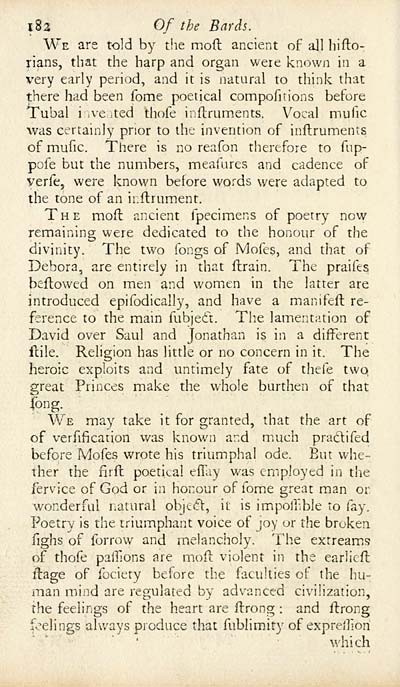Blair Collection > Critical dissertations on the origin, antiquities, language, government, manners, and religion, of the antient Caledonians, their posterity the Picts, and the British and Irish Scots
(220)
Download files
Complete book:
Individual page:
Thumbnail gallery: Grid view | List view

1 82 Of the Bards.
We are told by the mod ancient of all hifto-
rians, that the harp and organ were known in a
very early period, and it is natural to think that
there had been fome poetical compofitions before
Tubal iiveited thofe inftruments. Vocal mufic
was ccfftainly prior to the invention of inftruments
of mufic. There is no reafon therefore to fup-
pofe but the numbers, meafures and cadence of
verfe, were known before words were adapted to
the tone of an ir.flrument.
The moft ancient fpecimens of poetry now
remaining were dedicated to the honour of the
divinity. The two fongs of Mofes, and that of
Debora, are entirely in that ftrain. The praifes
befhowed on men and women in the latter are
introduced epifodically, and have a manifeil re-
ference to the main fubjecfi. The lamentation of
David over Saul and Jonathan is in a different
fcile. Religion has little or no concern in it. The
heroic exploits and untimely fate of thefe twq
great Princes make the whole burthen of that
fong.
We may take it for granted, that the art of
of verfification was known and m.uch pradtifed
before Mofes wrote his triumphal ode. But whe-
ther the firfl poetical eflliy was employed in the
fervice of God or in honour of fome great man or.
wonderful natural objecft, it is impoPnble to fay.
Poetry is the triumphant voice of joy or the broken
fighs of forrow and melancholy. The extreamiS
of thofe pall'ions are mofl violent in the earlicft
llage of fociety before the faculties of the iiu-
man mind are regulated by advanced civilization,
the feelings of the heart are ftrong : and ftrong
foelings always produce that fublimity of expreiliori
' ' which
We are told by the mod ancient of all hifto-
rians, that the harp and organ were known in a
very early period, and it is natural to think that
there had been fome poetical compofitions before
Tubal iiveited thofe inftruments. Vocal mufic
was ccfftainly prior to the invention of inftruments
of mufic. There is no reafon therefore to fup-
pofe but the numbers, meafures and cadence of
verfe, were known before words were adapted to
the tone of an ir.flrument.
The moft ancient fpecimens of poetry now
remaining were dedicated to the honour of the
divinity. The two fongs of Mofes, and that of
Debora, are entirely in that ftrain. The praifes
befhowed on men and women in the latter are
introduced epifodically, and have a manifeil re-
ference to the main fubjecfi. The lamentation of
David over Saul and Jonathan is in a different
fcile. Religion has little or no concern in it. The
heroic exploits and untimely fate of thefe twq
great Princes make the whole burthen of that
fong.
We may take it for granted, that the art of
of verfification was known and m.uch pradtifed
before Mofes wrote his triumphal ode. But whe-
ther the firfl poetical eflliy was employed in the
fervice of God or in honour of fome great man or.
wonderful natural objecft, it is impoPnble to fay.
Poetry is the triumphant voice of joy or the broken
fighs of forrow and melancholy. The extreamiS
of thofe pall'ions are mofl violent in the earlicft
llage of fociety before the faculties of the iiu-
man mind are regulated by advanced civilization,
the feelings of the heart are ftrong : and ftrong
foelings always produce that fublimity of expreiliori
' ' which
Set display mode to: Large image | Transcription
Images and transcriptions on this page, including medium image downloads, may be used under the Creative Commons Attribution 4.0 International Licence unless otherwise stated. ![]()
| Permanent URL | https://digital.nls.uk/76289031 |
|---|
| Description | A selection of books from a collection of more than 500 titles, mostly on religious and literary topics. Also includes some material dealing with other Celtic languages and societies. Collection created towards the end of the 19th century by Lady Evelyn Stewart Murray. |
|---|
| Description | Selected items from five 'Special and Named Printed Collections'. Includes books in Gaelic and other Celtic languages, works about the Gaels, their languages, literature, culture and history. |
|---|

